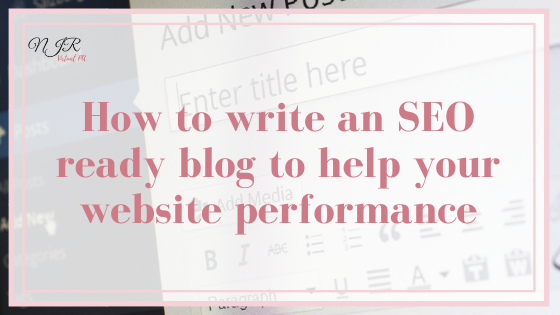
Blogging for your business is a great way of demonstrating the knowledge and experience you have with potential clients. But it also plays a vital part in the performance and ranking of your website. Using the right keywords and appropriate tags will help increase your visibility. Here are my top tips on how to write an SEO ready blog to help your website performance.
Writing a catchy headline for your blog
Your headline plays an important role in your blog. Not only is this what attracts your potential readers to click. But the keywords you pick play their part in the performance and ranking. When writing your headline, include key words and phrases that people will potentially search for. For help writing a great headline, I use Sharethrough which gives you a ranking of how your headline is performing and gives suggestions on how to improve. And it’s also totally free to use.
Opening your blog
The opening paragraph needs to be engaging and give an exert of what your blog is about. How engaging your first paragraph is will determine whether the blog is appropriate for your readers query and whether it’s engaging enough for them to read through to the end. Talk about the problem(s) your reader may be facing with a snippet of how your blog will help them and an outcome of what they’ll take away from it.
Blog word count
Ideally, blogs should be a minimum of 300 words long. The ideal maximum would be around 800 words. If you go a bit over that’s totally fine but just remember if it’s too long, your reader may lose interest. And your goal is to get your readers through to the end…
Include links in your blog
To increase the performance of your website, include internal and external links. They are really helpful for your readers by giving them everything they need on one page. But they also help when the likes of Google is crawling through code behind the scenes and sees these links.
Blog summary
A summary of your blog is there to emphasize what the reader has learnt and been able to take away from your blog. But is also an opportunity to link the topic back around to your services/products and how investing in what you offer could help them even further to find a solution to their problem.
Call to action
Always, always, always include a call to action at the end of your blog. Even if it’s a simple invite to contact you. It needs to be enticing and assertive. It’s another opportunity to use links too either to a booking system or maybe your online shop. Also include your preferred contact details here, again making it easy for them to reach out. Either a phone, email or contact form.
Blogging doesn’t have to be a daunting experience and when you get it right, it’s a fantastic way of demonstrating your knowledge and experience to your potential clients and readers and build a rapport with them before they’re ready to sign up. For more tips and tricks on SEO and rankings, why not check out my blog from the archives ‘The Basics for Optimising Your SEO‘.
If you’re looking for support setting up a blog, coming up with topics, a strategy or writing content then why not get in touch to find out how I could help engage with your audience, whilst increasing your website performance.
(See what I did there!?)
To find out more email me at info@njrvirtualpa.co.uk or book in for a free consultation now.

Recent Comments